The Writers in Dialogue Program sends American authors to Russia for readings, roundtables, and literary events hosted by Russian writers and publishers and brings Russian authors, editors, and critics to the United States. The program had its debut in April 2017 when American writer Yiyun Li visited Moscow, and Russian writers Lev Rubinstein, Elena Kostyuchenko, and Elena Chizhova came to New York.
Recent Events
Writers in Dialogue: 2020 Russian Poetry Translation
December 2020
American Writers in Russia
Yiyun Li
April 2017
Sergio De La Pava
November 2017
Matvei Yankelevich and Mónica de la Torre
March 2018
Eugene Ostashevsky and Elif Batuman
October 2019
Russian Writers in the U.S.
Kirill Medvedev
May 2019
Lev Rubinstein, Elena Kostyuchenko, and Elena Chizhova
May 2017
Recent Events
Writers in Dialogue: 2020 Russian Poetry Translation
At a time when international travel was nearly impossible, this iteration of Writers in Dialogue fostered a connection between American and Russian literary scenes through online communication, textual translation, and a digital workshop. PEN America’s Eurasia program—together with PEN Moscow and PEN Saint Petersburg—identified seven emerging and undertranslated Russian poets, while Russian American poet and professor Polina Barskova and the PEN Translation Committee selected seven American translators for the project.
Poet Duos:
- Ainsley Morse and Maria Galina
- Catherine Ciepiela and Alexandra Tsibulya
- Anna Halberstadt and Oksana Vasyakina
- Elina Alter and Ivan Sokolov
- Kevin Platt and Ekaterina Simonova
- Tyler James Green and Evgeniya Lavut
- Valeriya Yermishova and Nikita Sungatov
American Writers in Russia
Yiyun Li
In April 2017, Yiyun Li was the first American writer to visit Moscow under the Writers in Dialogue program. Her visit launched the series “Written in the USA,” organized in partnership with Russian cultural online platform Colta.ru to acquaint the Russian audience with American authors less-known or unknown in Russia.
In a lecture she gave during the program, Li talked about her personal journey to become an English-language writer. She spoke about the inspiration she got from Maxim Gorky as a child, the labels attached to her as a Chinese-American writer, and the challenges and rewards of abandoning her native Chinese to write in English.
Yiyun Li lecture in Moscow
Li also participated in a discussion with Russian editors, translators and writers, and went to Yasnaya Polyana, home of the great Russian writer Leo Tolstoy.
About the Writer
“A metaphor’s desire to transcend diminishes any human story, its ambition to illuminate blinds those who create metaphors.”
―Yiyun Li
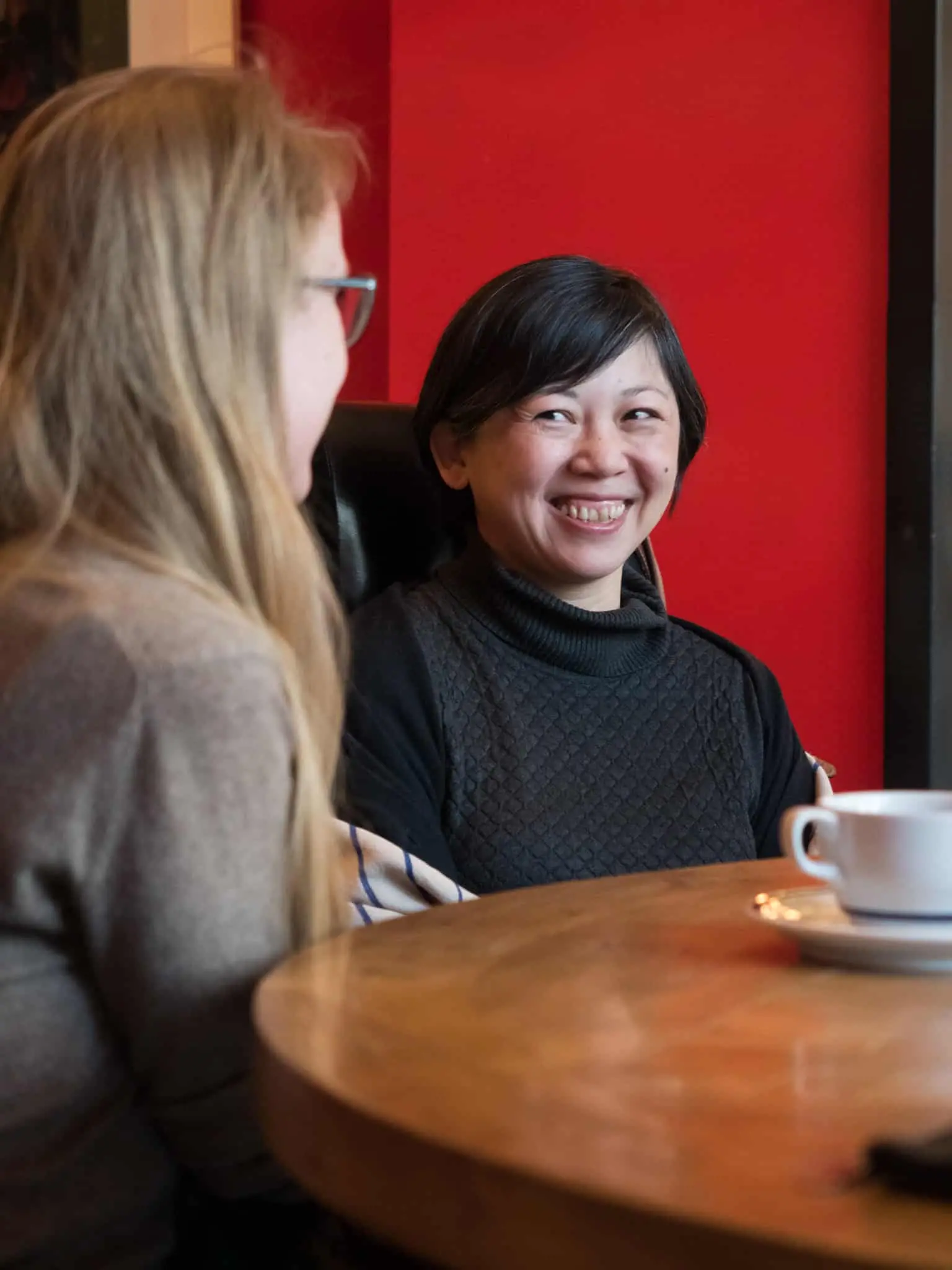
Yiyun Li was born in Beijing and moved to the United States in 1996. Her first short story collection, A Thousand Years of Good Prayers, won the 2005 Frank O’Connor International Short Story Award, the 2006 PEN/Hemingway Award, and The Guardian’s 2006 First Book Award. Li has won numerous other awards for her writing, including a gold medal in the California Book Awards, and is a 2010 MacArthur Fellow. She is a professor at University of California, Davis, and an editor of the Brooklyn-based literary magazine, A Public Space.
She reflected on the opportunity to visit Russia with PEN America:
“To be able to set afoot in a country and to directly exchange thoughts about current affairs, I feel, offers a rare opportunity to understand the country and how it looks at America, which would not be available to me. The conversations with Russian writers, critics and journalists, both in the formal setting of public events and informal setting of tea, coffee, and dinner, were eye-opening. Similar concerns of Russian interference of Ukraine, the future of America in Trump’s era, and how everyday Americans and Russians respond to these situations, including the involvement of the younger generation, were also an essential part of knowing the country.”
One of Li’s books will now be published in Russian after having been acquired by a Moscow publishing house.
Sergio De La Pava
American novelist Sergio De La Pava visited Moscow for Writers in Dialogue activities from November 30 to December 2, 2017. He was the second visiting writer in the “Written in the USA” series.
In his lecture, De La Pava discusses the question of national identity in literature, focusing on the Russian and American contexts. He goes on to identify “urgency and ambition” as the central qualities of classic Russian literature, and laments what he sees as the “anti-intellectualism” and lack of moral urgency in contemporary American literature. De La Pava concludes on a hopeful note, however, praising the achievements currently taking place in the U.S. literary subculture: “I like the margins. There’s freedom there, and anger, and energy, pretty much everything I value in artistic pursuits. The artist must be outside.”
About the Writer
“Intellectual discourse and investigation is admittedly great fun but only truly meaningful when conducted in the service of others.”
―Sergio De La Pava, A Naked Singularity
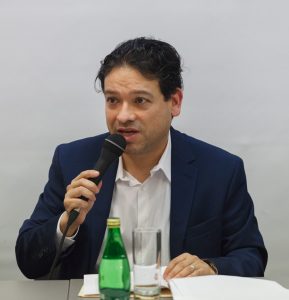 Sergio De La Pava is a Columbian-American novelist. He is best known for his first novel, A Naked Singularity, which was first self-published in 2008, and subsequently picked up by the University of Chicago Press. The novel was named one of the ten best works of fiction of 2012 by The Wall Street Journal, and went on to win the 2013 PEN/Robert W. Bingham Prize for best debut novel. De La Pava’s third novel, Lost Empress, will be published by Pantheon in 2018. De La Pava is also a lawyer and continues to work as a public defender in Manhattan; the American criminal justice system figures prominently in his fiction.
Sergio De La Pava is a Columbian-American novelist. He is best known for his first novel, A Naked Singularity, which was first self-published in 2008, and subsequently picked up by the University of Chicago Press. The novel was named one of the ten best works of fiction of 2012 by The Wall Street Journal, and went on to win the 2013 PEN/Robert W. Bingham Prize for best debut novel. De La Pava’s third novel, Lost Empress, will be published by Pantheon in 2018. De La Pava is also a lawyer and continues to work as a public defender in Manhattan; the American criminal justice system figures prominently in his fiction.
Reflecting on his visit to Russia, De La Pava said:
“I’m very grateful to everyone involved in facilitating and funding my recent trip to Moscow. Russia’s contribution to world literature is incomparable, and it was gratifying and inspiring to discover that its current literary culture remains vibrant. Literature is a global entity, making international conversation between its proponents critical. My time sharing thoughts and beliefs with other artists was above all compelling. This kind of dialogue, between writers from vastly different cultures, enriches everyone involved and the work we hold dear.”
Matvei Yankelevich and Mónica De La Torre
In March 2018, poet and founder of Ugly Duckling Presse Matvei Yankelevich and poet Mónica De La Torre visited Moscow as part of the “Written in the USA” series, co-organized by PEN America and colta.ru.
The writers’ visit consisted of two main events: a translation workshop with Mónica De La Torre conducted by Matvei Yankelevich, and readings and discussion about the state of contemporary poetry in Russia and the United States with leading literary figures of Moscow and St. Petersburg. Both events were held in the popular Moscow bar-gallery Flying Tavern (Перелетный кабак).
The discussion following the translation workshop was attended by the poets and translators Mikhail Aizenberg, Dmitry Kuzmin, and Alexander Skidan, as well as the colta.ru editor Gleb Morev and its founder Maria Stepanova.

A packed audience listened to the conversation about contemporary poetry and poetic publishing in Russia and the United States. In particular, the panelists discussed the state of small publishing houses in Russia, and whether the success of Ugly Ducking Presse—headquartered in Brooklyn—can be replicated in the Russian context.
About the Writers
 Matvei Yankelevich is a poet, teacher, translator, and founder of the New York City-based nonprofit publishing house Ugly Duckling Presse, which specializes in poetry, translation, and experimental nonfiction.
Matvei Yankelevich is a poet, teacher, translator, and founder of the New York City-based nonprofit publishing house Ugly Duckling Presse, which specializes in poetry, translation, and experimental nonfiction.
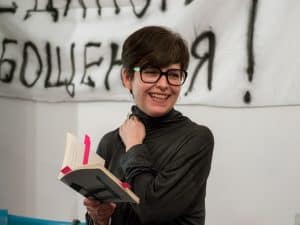 Mónica De La Torre, one of the authors published by Ugly Duckling Presse, is a member of the New York Foundation for the Arts and has written for Bomb Magazine and The Brooklyn Rail. She co-wrote the bilingual anthology of Mexican poetry Reversible Monuments: Contemporary Mexican Poetry (2002), and her translations from Spanish include collections of poetry from Lila Zemborain and Gerardo Deniz.
Mónica De La Torre, one of the authors published by Ugly Duckling Presse, is a member of the New York Foundation for the Arts and has written for Bomb Magazine and The Brooklyn Rail. She co-wrote the bilingual anthology of Mexican poetry Reversible Monuments: Contemporary Mexican Poetry (2002), and her translations from Spanish include collections of poetry from Lila Zemborain and Gerardo Deniz.
Eugene Ostashevsky and Elif Batuman
The next event in the framework of the “Written in the USA” program was held in Moscow and St. Petersburg from September 30 to October 5, 2019, in partnership with Russian cultural online platform Colta.ru and PEN St. Petersburg. This time, it was American writers Eugene Ostashevsky and Elif Batuman meeting Russian audience. PEN America held four public and two private events, with more than 100 participants in Moscow and St. Petersburg. These activities included public panel conversations, readings, a poetry workshop, and two private dinners bringing the U.S. writers together with leaders in the literary and creative communities in the two cities.
In Moscow, on October 1, at the Voznesensky Center, Eugene Ostashevsky and Elif Batuman took part in a comprehensive conversation led by the poet, translator, and literary critic Lev Oborin. Both Batuman and Ostashevsky have a deep connection with Russian literature and cite Russian literature as an influence for their work. Their discussion on bilingualism and their experiences with Russian literature and language was very well received and provided important insights for Russian audiences.
On October 2, Eugene and Elif read pieces from their work and answered questions from the audience. Elif shared parts from her new, yet-unfinished book, and Eugene read his Feeling Sonnets and excerpts from his work The Pirate Who Does Not Know the Value of Pi. The parts of his book were translated into Russian as part of “Your Language My Ear” translation symposium at the University of Pennsylvania. At a dinner in Moscow, PEN America brought Elif and Eugene together with Russian poets, publishers, editors, literary critics and journalists enabling them to deepen professional and personal ties.
The other part of their visit took place in St. Petersburg. At PEN St. Petersburg, Elif gave a talk, which she called “My ‘affair’ with Russian literature or why do I love Russian literature.”
A separate event was a translation workshop, in which participants were working on a translation of one of the Eugene sonnets together with him. The workshop offered an opportunity for Russian poets and translators to engage directly with the American writer and to polish their skills.
These events exposed Russian literary critics, historians, library staff, literature professors, writers, translators, and art professors to the work of American writers and built a tighter relationship between the two groups.
About the Writer
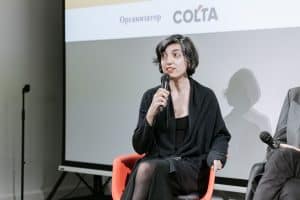 Elif Batuman is a Whiting Award winner and a regular The New Yorker author. She graduated from Harvard College and then received her doctorate in Comparative Literature from Stanford University. A few years after that she studied the Uzbek language in the Central Asian city of Samarkand. Her first book The Possessed’was more memoiristic and non-fiction and made her extremely popular. And her second novel, The Idiot, was a finalist for the 2018 Pulitzer Prize for Fiction.
Elif Batuman is a Whiting Award winner and a regular The New Yorker author. She graduated from Harvard College and then received her doctorate in Comparative Literature from Stanford University. A few years after that she studied the Uzbek language in the Central Asian city of Samarkand. Her first book The Possessed’was more memoiristic and non-fiction and made her extremely popular. And her second novel, The Idiot, was a finalist for the 2018 Pulitzer Prize for Fiction.
 Eugene Ostashevsky was born in Leningrad in 1968; his family moved to the USA when he was 11 years old. He is a historian of literature, a teacher, translator and poet, and he defended a thesis at Stanford University. Ostashevsky is the author of poetry anthologies The life and opinions of DJ Spinoza, Iterature, Enter Morris Imposternak Pursued by Ironies, and others. Besides, Ostashevsky is one of the best translators of Russian poetry into English. He translated the collection of prose, poetry, and drama of the OBERIU (together with Matvey Yankelevich) and the first collection of poetry of Russian poet Alexander Vvedensky.
Eugene Ostashevsky was born in Leningrad in 1968; his family moved to the USA when he was 11 years old. He is a historian of literature, a teacher, translator and poet, and he defended a thesis at Stanford University. Ostashevsky is the author of poetry anthologies The life and opinions of DJ Spinoza, Iterature, Enter Morris Imposternak Pursued by Ironies, and others. Besides, Ostashevsky is one of the best translators of Russian poetry into English. He translated the collection of prose, poetry, and drama of the OBERIU (together with Matvey Yankelevich) and the first collection of poetry of Russian poet Alexander Vvedensky.
“I want to say that I love the idea of this PEN program. I think its value does not just lie in encouraging positive perceptions of the US by the Russian cultural elite, but also enabling the influence of the more liberal facets of American society on Russia’s perception of its own immigrants, as well as its own potential as an immigration destination. A program that brings successful American immigrant writers to Russia and has them interact with Russian audiences is ultimately telling Russians that immigrants to Russia can become as Russian as they are; it is helping them use the mirror of America to change themselves for the better. I think that is what capable cultural diplomacy is all about.”
Russian Writers in the U.S.
Kirill Medvedev
Russian poet Kirill Medvedev took part in the PEN World Voices Festival in 2019.
Medvedev joined an incredible lineup for “Cry, the Beloved Country” on May 9, 2019, during which writers spoke of the hardships in their respective countries. Ma Jian (China), Raul Zurita (Chile), Ahmed Naji (Egypt), Jennifer Clement (Mexico/United States), Marianna Kiyanovska (Ukraine), Christos Ikonomou (Greece), and Medvedev shared personal accounts in their original languages with simultaneous translation and closed captioning.
Medvedev also participated in “The Politics of Poetry: Dissenting Poetics,” an event hosted in collaboration with Ugly Duckling Presse on May 8, 2019. Other members of the lineup included Valzhyna Mort, Marianna Kiyanovska, and Simone White. The poets shared excerpts of their work and then discussed the historical and contemporary responsibilities of the political poet, acknowledging both the power and danger of using written art to convey dissent.
Lev Rubinstein, Elena Kostyuchenko, and Elena Chizhova
The Russian writers Lev Rubinstein, Elena Kostyuchenko, and Elena Chizhova came to New York for the PEN World Voices Festival of International Literature and a series of literary events and meetings in May 2017.
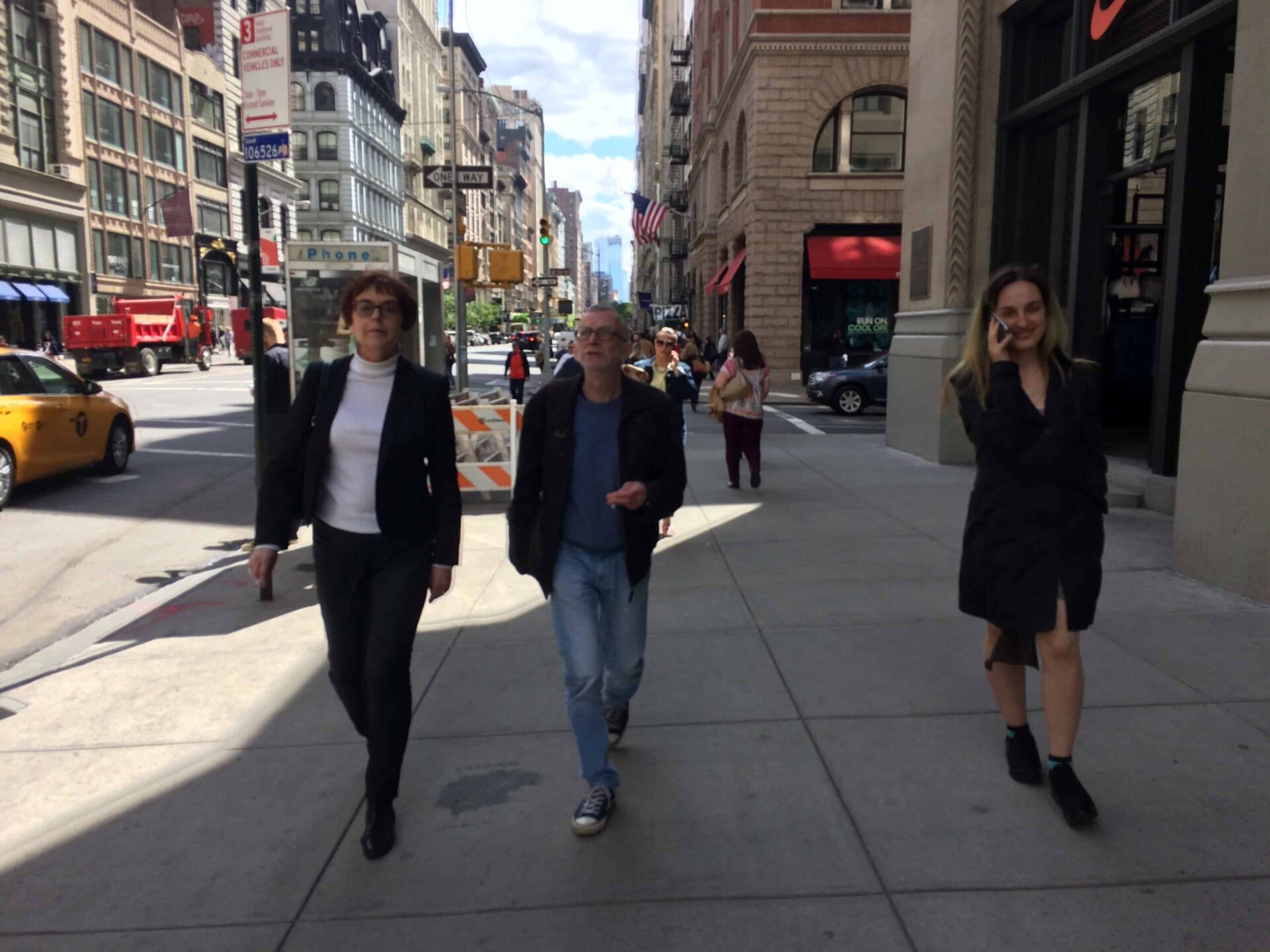
“This was my first time in the United States, my first time seeing New York with my own eyes. Before I had imagined myself crushed by the weight of this city of skyscrapers. But this impression, gathered from films and photographs, turned out to be deceptive. The city is full of a genuine freedom and energy, streaming endlessly. Moreover, it is unusually beautiful, but in its own non-European way.” – Elena Chizhova
Feminizm Po-Russki (Feminism à la Russian)
At the PEN World Voices Festival, three Russian women writers, Elena Chizhova, Elena Kostyuchenko, and A. Nune, from different genres and generations, discussed gender, power, and creative freedom in Russia. The panel was moderated by Sana Krasikov, author of The Patriots, an exploration of the Cold War and three generations of an American family. We heard from a chronicler of Pussy Riot and gay rights in Russia, a prize-winning novelist who traces the linked lives of women in a communal apartment in post-war Leningrad, and a writer who follows her heroine’s soul after death.
Lit Crawl: Three Russians Walk Into a Bar
The delegation participated in NYC Lit Crawl 2017, enjoying literary nights in bars around New York.

“The second [event] was an almost improvised evening event where, along with the terrific pianist Alexander Izbitser, a long-time denizen in New York, I performed as a singer (despite the fact that I am not a singer aside from a few chance performances). We sang and played basically without rehearsing, which, I hope, gave the affair an improvised feeling and charm. As far as I could tell, the audience enjoyed it quite a bit.” – Lev Rubinstein
Meeting with Editors
The delegation also met with editors from Grove Atlantic, New Directions Publishing, Maria B Campbell Associates, Archipelago Books, and Music and Literature during a breakfast hosted by Grove Atlantic. They also visited with editors from Ugly Duckling Presse.
After meeting an agent during her trip, Elena Kostyuchenko signed a contract for her collection It’s Us Who Will Live Here («Нам Здесь Жить»).
About the Writers
 Elena Chizhova is a Russian writer, winner of the 2009 Booker Award for the best Russian book of the year for her novel, The Time of Women. She is the director of the St. Petersburg branch of PEN.
Elena Chizhova is a Russian writer, winner of the 2009 Booker Award for the best Russian book of the year for her novel, The Time of Women. She is the director of the St. Petersburg branch of PEN.
“I got the impression that PEN America were invested in my account and were ready to provide us, the St. Petersburg Members of PEN International, with moral support. This is especially important now in these difficult times when the political relations between Russia and the United States are dipping below zero, so to speak. But it is precisely at times like these when the ties between analogous social organizations in our two countries as well as their mutual support become all the more vital. The same is true of the cultural ties that we the artists must maintain. As everyone knows, politics may change, but culture remains.”

Elena Kostyuchenko is a journalist, writer and activist. She is a correspondent of the newspaper Novaya Gazeta, advocates for the LGTB community, and has penned two books, Unwanted on Probation and It’s Us Who Will Live Here.
“It’s strange to write this, but the week I spent with you in New York was the most inspirational experience that I’ve had in the last few years. Now that I’ve returned to Russia, I feel as charged as the battery of a new iPhone. Most likely I will soon return to being aware of my own weariness and limitations, but for now I am still energized.”
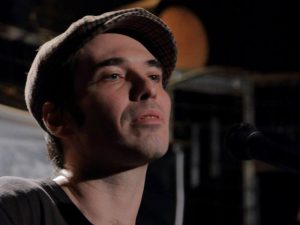
Kirill Medvedev is a writer, musician, and activist based in Moscow. In 2007, he set up The Free Marxist Press, where he published translations of Issac Deutscher, Ernest Mandel, and Jean-Luc Godard, among others. His book It’s No Good was published by n+1 with Ugly Duckling Presse in 2012. Medvedev is also the vocalist and guitarist of Arkady Kots, a riot-folk band, and an author of essays and articles in Chto Delat, The Guardian, and other publications. He won the Andrei Bely prize for poetry in 2014.

Lev Rubinstein is a Russian poet, literary critic, and essayist. He won the NOS-2012 “New Voices” prize for his novel, Signs of Attention, and the 1999 Andrey Bely Prize, the oldest independent literary prize in Russia.
“Thank you to those who decided to invite me to New York. Thank you to those circumstances that allowed me to make new friends and see old ones. Thank you to the PEN movement, whose ideas and values I share entirely. Thank you to my beloved New York for allowing me to wander about your streets. “
